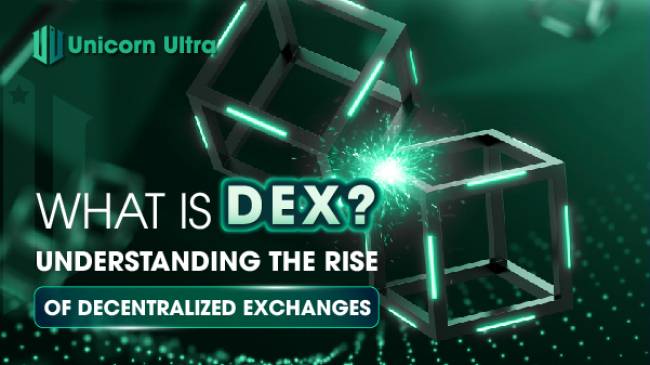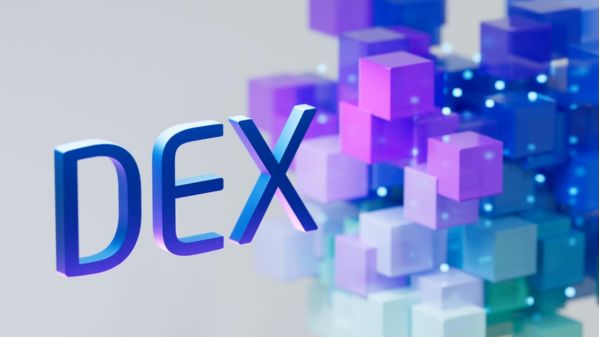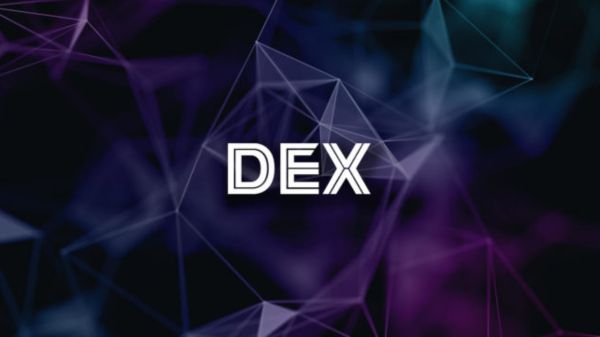Categories: General Information
What Is DEX? Understanding the Rise of Decentralized Exchanges
Discover the world of decentralized exchanges (DEXs) in this comprehensive blog post. Learn what is DEX, how it works, its advantages and disadvantages, how to interact with it, and the key differences between DEXs and centralized exchanges (CEXs).
Decentralized finance (DeFi) has been gaining significant traction in recent years, revolutionizing traditional financial systems by providing innovative solutions built on blockchain technology. One of the key components of the DeFi ecosystem is decentralized exchanges, commonly known as DEXs. In this blog post, we will explore what is DEX, how it operates, its advantages and disadvantages, how to interact with them, and the fundamental distinctions between DEXs and centralized exchanges (CEXs).
Table of Contents
What Is DEX?
What is DEX? A decentralized exchange (DEX) is a type of cryptocurrency exchange that operates on a blockchain network, allowing users to trade digital assets directly with one another without the need for intermediaries. Unlike centralized exchanges, where users deposit their assets into a centralized platform and trade within that ecosystem, DEXs facilitate peer-to-peer transactions while maintaining custody of users' funds.

How Does a DEX Work?
DEXs employ smart contracts, which are self-executing contracts with the terms of the agreement directly written into code. These smart contracts act as automated intermediaries, matching buy and sell orders between users, executing trades, and transferring ownership of assets. By eliminating the need for a centralized authority, DEXs promote transparency, security, and censorship resistance.
DEXs typically utilize liquidity pools to facilitate trading. These pools consist of funds provided by liquidity providers (LPs) who deposit their assets into the pool in exchange for earning a share of the transaction fees generated by the DEX. The liquidity in these pools enables seamless trading by ensuring that there are sufficient funds available for users to execute their trades.
Advantages of DEXs
- Decentralization: DEXs eliminate the reliance on centralized authorities, promoting a peer-to-peer trading environment that aligns with the principles of blockchain technology.
- Security: With DEXs, users retain custody of their funds, significantly reducing the risk of hacks and thefts often associated with centralized exchanges.
- Privacy: DEXs prioritize user privacy by allowing traders to maintain control over their personal information and trading data.
- Global Accessibility: DEXs operate 24/7 and are accessible to anyone with an internet connection, enabling users from around the world to participate in the ecosystem.
- Lower Fees: DEXs often have lower trading fees compared to centralized exchanges since there are no intermediaries involved.

Disadvantages of DEXs
- Limited Liquidity: Compared to centralized exchanges, DEXs may have lower liquidity due to fragmented trading volumes across multiple platforms. This can result in slippage and less favorable trading conditions for certain assets.
- Transaction Speed and Scalability: Some DEXs currently face challenges with transaction speed and scalability due to the limitations of the underlying blockchain networks they operate on.
- User Experience: While user interfaces have improved over time, DEXs can still be more complex and less intuitive for new users compared to centralized exchanges.
- Smart Contract Risks: DEXs rely on smart contracts, which can be susceptible to bugs or vulnerabilities that could lead to the loss of funds if exploited.
What are the most popular DEXs?
As of my knowledge cutoff in September 2021, some of the most popular decentralized exchanges (DEXs) based on trading volume, user activity, and reputation include:
- Uniswap: Uniswap is one of the leading and most widely used decentralized exchanges. It operates on the Ethereum blockchain and utilizes an automated market maker (AMM) model. Uniswap allows users to trade a wide range of ERC-20 tokens directly from their Ethereum wallets without the need for an intermediary.
- SushiSwap: SushiSwap is a decentralized exchange that forked from Uniswap, with additional features and community governance. It aims to enhance the decentralized nature of liquidity provision and offers users incentives to participate as liquidity providers through yield farming.
- PancakeSwap: PancakeSwap is a decentralized exchange built on the Binance Smart Chain (BSC). It has gained popularity due to its lower transaction fees compared to Ethereum-based DEXs. PancakeSwap offers a range of trading pairs and liquidity provision opportunities.
- 1inch: 1inch is a decentralized exchange aggregator that sources liquidity from multiple DEXs to provide users with the best available prices. It optimizes trades across various liquidity pools, making it a popular choice for traders seeking the most favorable rates.
- Curve Finance: Curve Finance is a DEX designed specifically for stablecoin trading. It focuses on low slippage and efficient stablecoin swaps, making it a preferred platform for users looking to exchange stablecoins with minimal price impact.
- Balancer: Balancer is an automated portfolio manager and liquidity provider built on Ethereum. It enables users to create custom liquidity pools with multiple assets and different weightings, allowing for more flexible and customizable trading strategies.
- Aave's Uniswap Market: Aave, a decentralized lending platform, introduced the Uniswap Market, allowing users to trade tokens directly within the Aave protocol while utilizing flash loans for leveraged trading and arbitrage opportunities.
- Bancor: Bancor is a decentralized liquidity protocol that enables users to swap tokens directly via smart contracts. Bancor also offers liquidity providers continuous fees for supplying liquidity to the protocol.
- QuickSwap: QuickSwap is a decentralized exchange running on the Polygon (previously Matic) network, offering fast and low-cost transactions. It has gained popularity due to its scalability and usability.
Please note that the DeFi space is rapidly evolving, and new DEXs may have emerged or gained popularity after my knowledge cutoff. It's essential to conduct your research, check current data, and verify the security and legitimacy of any DEX you plan to use. Always exercise caution and consider factors such as trading fees, liquidity, security, and user reviews before engaging in decentralized exchange activities.
How Do You Interact with a DEX?
To interact with a DEX, users typically need a cryptocurrency wallet that is compatible with the DEX platform. They can connect their wallets to the DEX, browse available markets, and execute trades directly from their wallets. Some DEXs also offer additional features such as limit orders, lending, and staking options.

What are the risks of using a DEX?
Using a decentralized exchange (DEX) offers several advantages, such as increased privacy, non-custodial trading, and access to a broader range of cryptocurrencies. However, there are also risks associated with using DEXs. Some of the key risks include:
- Smart Contract Risks: DEXs operate using smart contracts, which are subject to potential vulnerabilities and bugs. If there is a flaw or exploit in the smart contract's code, it could lead to financial losses, including theft of funds from the exchange or manipulation of trades.
- Impermanent Loss: Liquidity providers in DEXs are exposed to impermanent loss, which occurs when the value of the tokens in the liquidity pool diverges from holding them separately. In volatile markets, liquidity providers may experience losses compared to simply holding the tokens outside the pool.
- Limited Order Book Depth: DEXs may have limited order book depth, especially for less popular or low-liquidity trading pairs. This can result in wider bid-ask spreads and increased slippage during trades.
- Regulatory Uncertainty: DEXs operate in a rapidly evolving regulatory environment. The lack of regulatory clarity in some jurisdictions may expose users to potential legal risks, and the regulatory status of DEXs may change over time.
- User Errors: Since DEXs are non-custodial and rely on user-generated private keys, there is a higher risk of user errors leading to the loss of funds. Mistakes in entering wallet addresses, incorrect transaction settings, or losing access to private keys can result in irreversible losses.
- Scams and Fake Tokens: Some DEXs may list fake or scam tokens, which can lead to users unknowingly trading worthless or fraudulent assets. It's essential to exercise caution and conduct thorough research before trading any token on a DEX.
- Lack of Customer Support: DEXs typically have limited or no customer support compared to centralized exchanges. If users encounter issues or have questions, there may be fewer avenues for seeking assistance or dispute resolution.
- Front-Running and Miner Extractable Value (MEV): In some cases, malicious actors may attempt to front-run transactions on DEXs to exploit price movements. Additionally, the order execution order on public blockchains may be manipulated by miners to extract profits from certain transactions.
- Limited Recovery Options: Unlike centralized exchanges that may offer account recovery or fund retrieval in case of account compromise or loss, DEXs usually lack these recovery mechanisms. Users are solely responsible for securing their wallets and private keys.
- Lack of Fiat Support: Many DEXs do not directly support fiat currency deposits and withdrawals. Users may need to go through additional steps, such as using a centralized exchange, to convert fiat into cryptocurrencies before trading on a DEX.
Despite these risks, DEXs have grown in popularity due to their decentralized nature and the control they give users over their assets. To mitigate risks, users should practice good security measures, research the DEX's reputation and security features, and stay informed about potential risks and updates in the DeFi space.
DEX vs CEX
Centralized exchanges (CEXs) and DEXs have distinct characteristics and cater to different user preferences. While CEXs offer convenience, speed, and higher liquidity, they require users to trust a centralized authority with their funds. On the other hand, DEXs prioritize decentralization, security, and privacy, but may have lower liquidity and user experience challenges.
In recent years, hybrid exchanges have emerged, combining elements of both CEXs and DEXs to offer users the benefits of both models. These hybrid exchanges aim to provide a more user-friendly experience without compromising on security and decentralization.
Conclusion
In conclusion, decentralized exchanges (DEXs), also known as DEX, have revolutionized the way users trade digital assets by promoting decentralization, security, and privacy. DEXs, or decentralized exchanges, operate on blockchain networks and provide a peer-to-peer trading environment where users can directly trade with each other without the need for intermediaries. By understanding what is DEX and how it works, users can navigate the decentralized finance space successfully. DEXs offer advantages such as decentralization, security, privacy, global accessibility, and lower fees. Despite certain limitations, such as limited liquidity and transaction speed challenges, DEXs continue to shape the future of finance. As the DeFi ecosystem evolves, DEXs, or decentralized exchanges, play a pivotal role in empowering users and contributing to a more inclusive and accessible financial landscape. Let's go with https://uniultra.xyz/ to follow the latest information on the market.
